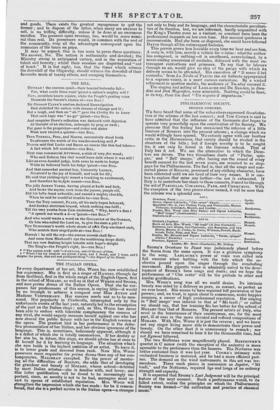PHILHARMONIC SOCIETY.
SECOND CONCERT,
WE have heard that some of the subscribers expressed dissatisfac- tion at the scheme of the last concert ; and TOM COOKE is said to have admitted that the influence of the Germanic diet began to operate very powerfully upon the constitution of the Society. We presume that this feeling has occasioned the infusion of a little tincture of RossINI into the present scheme ; a change which we would willingly have spared. We entirely agree with our brother critic in the Harmonicon, that variety should be studied in the structure of the bills ; but if foreign novelty is to be sought for, it can only be found in the German school. That of Italy has it not. We see the alternative to 'which the Direc- tors are driven. The two threadbare duets of "Parlar, spie- gar," and " Bell' imago," after having run the round of every benefit concert for the last seven years, are resorted to as stop- gaps for the Philharmonic. The fact is, that all the songs and con- certed pieces of RossiNi, possessed of any striking character, have been reiterated until we are tired of their very names. It is use- less to explore that mine any further—the ore is exhausted. If Italy is to contribute her share to these concerts, it must be through the aid of PAESIELLO, CIMAROSA, PARR, and CHERUBINI. With the exception of the two pieces above named, it will be seen that the scheme was a splendid one.
ACT I.
Overture, Faust Spohr. Scena, Signor Lablache, "Che sento" (Faust) Quartetto (No. 4), two Violins, Viola. and Violoncello, Messrs Tolbeque, Griesbach, Moralt, and Lindley Beethoven. Duetto, Mrs. Wood (late Miss Paton) and Signor Lablache, "Bell' imago" (Semiramide) Rossini. Sinfonia in D Beethoven.
ACT IL
Sinfonia (Jupiter) Mozart. Recit. ed Aria, Mrs. Wood, " hfi tradl" (II Don Giovanni) Mozart. Notturno, two Oboes, two Clarinetts, two Bassoons, and two Horns, Messrs. G. Cooke, G. Irwin, Willman, Powell, Mack-
intosh, Tully, Platt, and Rae Mozart. Duetto, Mr. Bennett and Signor Lablache, "Parlar, spiegar"
(Pietro P Eremita) Rossini.
Overture, Egmont Beethoven.
Leader, Mr. Mod—Conductor, Mr. Bishop.
SPOHR'S Overture to Faust was judiciously placed before the Scena from the same opera. It was a glorious symphony to the song. LABLACHE'S power of voice was called into full exercise when battling with the tide which the or- chestra poured upon the singer through the concluding movement. His gigantic voice is admirably suited to the deve- lopment of SPOHR'S bass songs and duets ; and we hope the performance of " Che sento" will be the prelude to other and similar gratifications. ' Mrs. Woon's song was all we could desire. Its intrinsic beauty was aided by a delivery as pure, as correct, as perfect as we ever heard. She seems to have regained full possession of her powers ; and, we trust, is again about to commence, under happier auspices, a career of high professional reputation. Her singing in " Bell' imago" was inferior to that of " Mi tradi ;" or rather we should say, that her training fits her better for the school of MOZART than that of ROSSINI. The present artists of Italy, who revel in the luxuriances of their countryman, are, for the most part, ill at ease in the more elevated and refined compositions of MOZART. With Mrs. Woo") it is just the reverse ; and we know not any singer living more able to demonstrate their power and beauty. On the other duet it is unnecessary to remark ; nor should we have remained to hear it for the thousandth time, had not Egmont followed. The two Sinfonias were magnificently played. BEETHOVEN'S quartet in C minor (with the exception of the andante) is more agreeable to the performers than the hearers. The Notturno was better sustained than it was last year. Cowries intimacy with orchestral business is matured, and he had a more efficient part- ner. The demand on the wind instruments in this act was tre- mendous. Three such pieces in succession as Jupiter, " Mi tradi' " and the Notturno, required lips and lungs of no ordinary strength and capacity. It is expected that SPOHICS Last Judgment will be the principal feature of the next concert. Such a performance would, to its fullest extent, realize the principles on which the Philharmonic Society was formed—" the cultivation and practice of classical music."


























 Previous page
Previous page